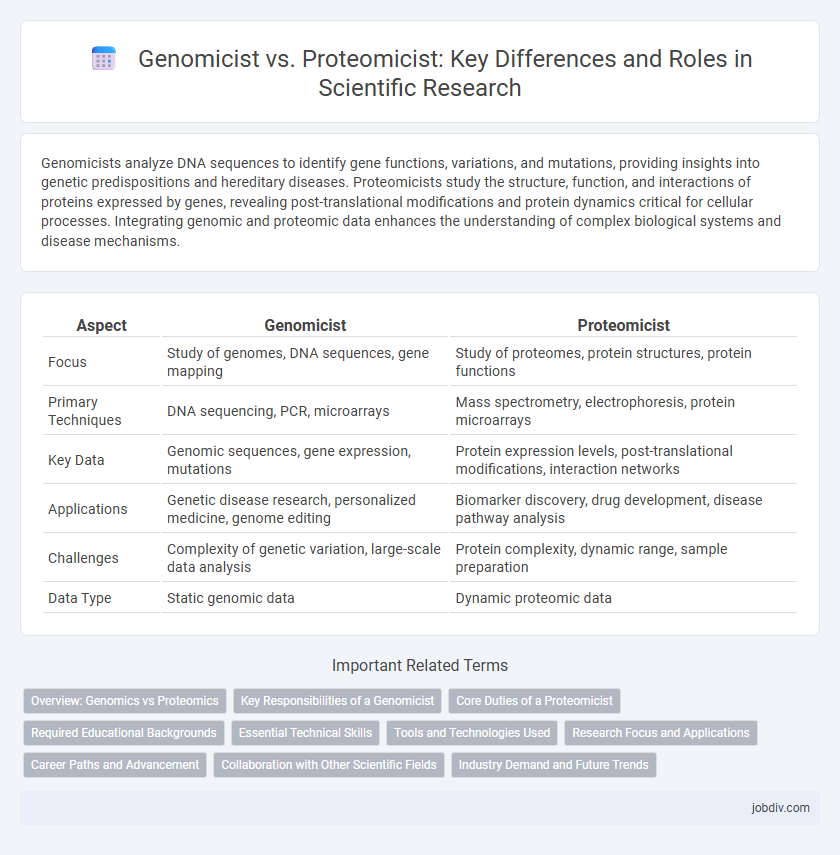Genomicists analyze DNA sequences to identify gene functions, variations, and mutations, providing insights into genetic predispositions and hereditary diseases. Proteomicists study the structure, function, and interactions of proteins expressed by genes, revealing post-translational modifications and protein dynamics critical for cellular processes. Integrating genomic and proteomic data enhances the understanding of complex biological systems and disease mechanisms.
Table of Comparison
| Aspect | Genomicist | Proteomicist |
|---|---|---|
| Focus | Study of genomes, DNA sequences, gene mapping | Study of proteomes, protein structures, protein functions |
| Primary Techniques | DNA sequencing, PCR, microarrays | Mass spectrometry, electrophoresis, protein microarrays |
| Key Data | Genomic sequences, gene expression, mutations | Protein expression levels, post-translational modifications, interaction networks |
| Applications | Genetic disease research, personalized medicine, genome editing | Biomarker discovery, drug development, disease pathway analysis |
| Challenges | Complexity of genetic variation, large-scale data analysis | Protein complexity, dynamic range, sample preparation |
| Data Type | Static genomic data | Dynamic proteomic data |
Overview: Genomics vs Proteomics
Genomics involves the study of an organism's complete set of DNA, focusing on gene sequences, structures, and functions to understand hereditary information. Proteomics examines the entire protein complement expressed by a genome, analyzing protein structures, functions, and interactions to elucidate cellular processes. While genomics provides a blueprint of potential biological functions, proteomics reveals dynamic cellular activities and protein modifications essential for understanding phenotypic outcomes.
Key Responsibilities of a Genomicist
A genomicist specializes in analyzing DNA sequences to identify genetic variations and understand gene functions, utilizing techniques such as genome sequencing, bioinformatics, and gene mapping. Their key responsibilities include interpreting genomic data to uncover disease associations, designing experiments for gene expression studies, and developing personalized medicine strategies based on genetic profiles. Genomicists collaborate with interdisciplinary teams to translate genomic insights into diagnostic tools and therapeutic targets.
Core Duties of a Proteomicist
Proteomicists specialize in analyzing the structure, function, and interactions of proteins within a biological system, using techniques such as mass spectrometry and protein microarrays to identify protein expressions and modifications. They are responsible for characterizing protein complexes, understanding post-translational modifications, and mapping protein-protein interaction networks to elucidate cellular processes. This role is critical for advancing biomarker discovery, drug target identification, and personalized medicine.
Required Educational Backgrounds
Genomicists typically require a background in molecular biology, genetics, or bioinformatics, often holding advanced degrees like a master's or Ph.D. in genomics or related fields, emphasizing computational analysis of DNA sequences. Proteomicists generally possess expertise in biochemistry, molecular biology, or analytical chemistry, with graduate-level training focusing on protein structure, mass spectrometry, and protein interaction networks. Both disciplines demand strong foundations in laboratory techniques and data analysis, but genomicists prioritize genetic sequencing knowledge while proteomicists specialize in protein characterization methodologies.
Essential Technical Skills
Genomicists require expertise in DNA sequencing technologies, bioinformatics tools for genome assembly, and variant analysis to interpret genetic data accurately. Proteomicists must master mass spectrometry techniques, protein separation methods, and software for protein identification and quantification. Both disciplines demand strong computational skills, proficiency in statistical analysis, and understanding of molecular biology fundamentals to advance research effectively.
Tools and Technologies Used
Genomicists primarily use next-generation sequencing (NGS) platforms, CRISPR gene-editing tools, and bioinformatics software for genome assembly and variant analysis. Proteomicists rely on mass spectrometry, two-dimensional gel electrophoresis, and protein microarrays to identify and quantify proteins and post-translational modifications. Both fields integrate advanced computational tools, including machine learning algorithms, to interpret complex biological datasets effectively.
Research Focus and Applications
Genomicists concentrate on the analysis and interpretation of an organism's complete DNA sequence, enabling advances in gene sequencing, genetic variation studies, and personalized medicine. Proteomicists focus on the large-scale study of proteins, their structures, functions, and interactions, driving innovations in biomarker discovery, drug development, and disease mechanism elucidation. The distinct research focus of genomicists on nucleic acids complements the proteomicists' emphasis on functional protein expression, together enhancing comprehensive biological understanding and therapeutic strategies.
Career Paths and Advancement
Genomicists primarily focus on analyzing DNA sequences and genetic variation, leading to career opportunities in bioinformatics, personalized medicine, and genetic research. Proteomicists specialize in studying protein structures and functions, advancing in fields like drug development, biomarker discovery, and clinical diagnostics. Both career paths require expertise in data analysis and laboratory techniques, with advancement often linked to interdisciplinary collaboration and technological proficiency.
Collaboration with Other Scientific Fields
Genomicists collaborate extensively with bioinformaticians, evolutionary biologists, and medical researchers to analyze DNA sequences and identify gene functions, enabling breakthroughs in personalized medicine and disease genomics. Proteomicists work closely with biochemists, structural biologists, and pharmacologists to characterize protein structures, interactions, and functions, facilitating drug target identification and biomarker discovery. Integration of genomics and proteomics data fosters interdisciplinary research, enhancing the understanding of complex biological systems and accelerating translational science.
Industry Demand and Future Trends
Genomicists and proteomicists are in high demand due to advancements in personalized medicine and biotechnology, with genomicists driving growth in genetic data analysis for disease prediction and gene editing technologies. Proteomicists play a crucial role in drug development and biomarker discovery by analyzing protein functions and interactions, addressing industry needs for targeted therapies. Future trends emphasize integration of multi-omics data, increasing AI utilization, and expanding roles for both fields in precision medicine and synthetic biology.
Genomicist vs Proteomicist Infographic

 jobdiv.com
jobdiv.com